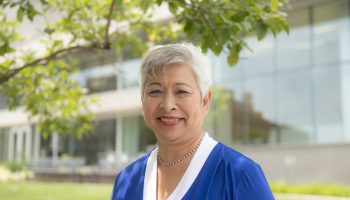
There’s a difference between hope and optimism. In a nutshell, hope is active, and optimism is passive.
According to psychologist Utpal Dholakia in a 2017 issue of Psychology Today, “to be optimistic in a general way about our lives will serve us well, mentally and physically. But when the chips are down, and when we need a powerful shot of motivation to help us find new ways to reach our goal and push us forward towards its achievement, there is no substitute for hope.”
Hope propels, history guides, and a holistic point of view inspires Liesbet Steer to seek more practical approaches to understanding and confronting multifaceted international development challenges. “(P)assionate about human development, imaginative partnerships (and) innovative sources of finance,” Steer said she is open “to disruptive ideas.”
At 3 p.m. Saturday in the Hall of Philosophy, Steer will address the Chautauqua Women’s Club’s Contemporary Issues Forum with a talk titled “From the Red River Delta to the Great Rift Valley: How East Asia’s Miracle Can Inform Africa’s Future.”
The Red River flows from Yunnan province in Southwest China through northern Vietnam to the broad wetland delta from which it empties into the Gulf of Tonkin in the South China Sea. The Great African Rift Valley extends from landlocked Ethiopia south to central Mozambique, which borders the Indian Ocean on the southeastern side of Africa.
An international development and finance expert, Steer is currently the executive director of Systemiq’s People in the New Economy initiative and a senior adviser to the Rockefeller Foundation.
Since 1913, the Rockefeller Foundation has been promoting “the well-being of humanity throughout the world.” Steer is “supporting the design of the new School Meals Impact Accelerator … for scale up of home-grown school meals.”
Through her work with the School Meals Coalition, she co-founded the foundation’s Sustainable Finance Initiative and chaired its steering committee. It is “working with national and subnational governments to identify locally driven financial solutions to support local agriculture.”
Systemiq, a certified B Corporation since 2018, describes itself as “a highly collaborative system designer, developer and disruptor.” It is focused on achieving the Sustainable Development Goals adopted in 2015 by all United Nations member states and the Paris Climate Accords’ temperature goal agreed to that same year by “unlock(ing) system change.”
In order “to build an economy that provides prosperity for all, stabilizes the climate and regenerates nature for generations to come,” Systemiq is developing “trusted, wholehearted partnerships with leaders in civil society, innovative investors, government, business and finance.”
Steer also serves as chair of the board of ODI Global and on the Global Leadership Council of UNICEF’s Generation Unlimited, the High-Level Steering Group of the Education Outcomes Fund and the Advisory Group on Education Financing of the World Bank.
The developmental needs, well-being and aspirations of people in developing nations have been at the forefront of Steer’s concerns for many years.
“How do you build capacity among human beings to take charge of their own destiny?” she said. “(That’s) the East Asia story, and Africa, too.”
Growing up near the North Sea in the town of Bruges in Belgium’s Flemish Region, Steer spoke Flemish and Dutch, which she said are very similar. Her second language was French, followed by English and German. Belgium is surrounded on three sides by France, the Netherlands, Germany and Luxembourg.
“Even into university, we would still take language courses,” she said. “There was more liberal arts then. English has increasingly become the language of international work. When I first started, it was French, but now it’s English.”
In college, Steer studied economics.
“I learned a lot about economic history, different economies and developing parts of countries,” she said. “So I did development as an interest starting in college. Belgium is small. Maybe the stepping stone was being exposed to other countries. … Belgium is a little insulated.”
Although Steer earned her Master of Science in Quantitative Economics and highly prized honors from the University of Antwerp from 1990 to 1994, she left Belgium to spend her final year on exchange at the University of Warwick in the United Kingdom.
In Antwerp, and then the following year at the Business School at Erasmus University in Rotterdam, the Netherlands, she worked as a research analyst prior to becoming a research associate at the London School of Economics and Political Science. During this time, much of her research centered on tourism.
At the London School of Economics in 1998 and 1999, she completed her coursework for her Doctor of Philosophy in Development Economics.
“The UK was the start, and from there on, I started exploring different countries,” Steer said. “Most important, I went out to Vietnam … to do my doctorate and to start looking at the development story of Southeast Asia. There was an opportunity with a professor who had some work. It was at a time when Vietnam was going through a remarkable transition from a basic socialist economy to a more market-based system.”
She continued: “Former Eastern Europe and Russia were going through a similar break and change. Vietnam and Eastern Europe did it very differently, and that’s what my dissertation was on.”
From 1999 to 2002, Steer served as principal investigator and team leader for projects for the World Bank and the International Finance Corporation, including on the “divestiture and privatization of state-owned enterprises,” “employment generation in Vietnam” and small and medium enterprise (SME) “development strategy in Vietnam, Cambodia and Laos.”
And at the Centre for International Economics in Canberra, Australia, she conducted studies on “private sector development and response to economic reform” and on “on regulatory constraints to private sector development” in Vietnam.
Leaving Vietnam and her fieldwork, Steer returned to the United Kingdom — this time to the University of East Anglia — to complete her doctoral dissertation on the “stimulation and support of private enterprise,” titled “Informal Institutions in Transition: A Study of Private Sector Development in Vietnam.”
In Jakarta, Indonesia, from 2004 to 2007, Steer managed the Asia Foundation’s multimillion dollar “economic research, technical assistance and policy program,” including 40 staff and consultants, as its director and chief economist. Among her many responsibilities, she engaged extensively with local and national decision makers.
On Boxing Day 2004, the epicenter of the undersea Sumatra-Andaman megathrust earthquake struck off Aceh, along Indonesia’s northwest coast. Its 720–780 mile-long fault rupture, the longest ever observed, generated a series of massive waves as high as 100 feet that killed nearly 228,000 people in 14 countries. The global humanitarian response to the Asian Tsunami — the worst tsunami and one of the deadliest natural disasters in recorded history — yielded over $14 billion.
During the immediate aftermath of this catastrophic event, Steer “worked with the local government and local organizations to streamline registration and support for SMEs.”
“Aceh … was greatly affected,” she said. “I spent a lot of time (there) helping the government to register businesses and get people back on their feet and supporting the economy.”
By 2008, Steer had returned to the United Kingdom, working as a research fellow at a think tank, the Centre for Aid and Public Expenditure at ODI (Overseas Development Institute) Global in London, and then as ODI Global’s director of development progress.
To “better measure and communicate what works and why,” she designed, fundraised for and led a $10 million “flagship program on development progress funded by the Bill & Melinda Gates Foundation, including 50 case studies” demonstrating progress.
“That’s where I made the switch from the private sector to human development and health and education,” Steer said. “… I was working on success stories in development — which countries had done well. I started to look more closely at education and health issues.”
As a fellow from 2013 to 2015 in the Global Economy and Development program at Brookings Institution, a nonpartisan think tank in Washington D.C., Steer wrote the seminal report, “Financing Education: Opportunities for Global Action.”
After it was presented to the 2015 Oslo Summit on Education for Development, it provided the foundation for the creation of the Education Commission, chaired by former U.K. Prime Minister and U.N. Special Envoy for Global Education Gordon Brown. Steer was its executive director for seven years.
Under her leadership, this global commission issued “The Learning Generation,” a flagship report “involving a core team of 30 research staff and more than 100 researchers in affiliated research organizations around the world.”
Steer then led several initiatives to implement its recommendations — including the Sustainable Finance Initiative for the School Meals Coalition. During 2023 and 2024, she shepherded their transition as the Learning Generation Initiative to the Education Development Center, which had been established in 1958 and headquartered in Waltham, Massachusetts.
In addition, she incubated several innovative financing instruments — including the International Financing Facility for Education, Greater Share and the Education Outcomes Fund — which bring together the public and private sector. And she established the Global Education Forum, a bilateral and multilateral donor platform, which ODI now hosts.
“Over the past three to five years, as I was doing work on education and international development, I became convinced we were working too much in silos,” Steer said. “Many working in the climate space aren’t factoring in humans. The oceans are similar.”
Then she met American philanthropist Greg Carr, who, through his own foundation, had initiated the Gorongosa Restoration Project in Mozambique. For many years, Steer said, she had worked in Africa on various topics.
“(He was doing) all this work on the protection of nature, and I was working on people,” she said. “When I met Greg, I knew that conservation groups were embedding people in the local communities, but Greg took it much farther.”
Hence, they joined forces on the integration of economic opportunity, human development and environmental conservation efforts at Gorongosa National Park.
On Saturday at the Contemporary Issues Forum, Steer will trace “East Asia’s development journey from the post-war challenges of the Red River Delta to the rise of world-class economies, drawing parallels to Africa’s current demographic and economic crossroads.” With Africa’s population projected to reach 4 billion by 2100, and its youth set to surpass the global labor force by 2035, she contends that the stakes are global.
She will also illuminate “powerful lessons in human capital investment, entrepreneurial ecosystems and sustainable natural resource management, (and offer) a hopeful, actionable roadmap for turning Africa’s looming pressures into transformative opportunities.”




